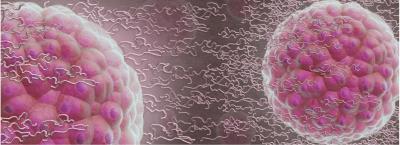Unlike normal cells, stem cells are pluripotent — they can become any cell type, which makes them powerful potential treatments for diseases such as diabetes, leukemia and age-related blindness. However, maintaining this versatility until the time is right is a major challenge. This week in ACS Central Science, researchers reveal that mimicking a natural process called diapause can halt stem cells, effectively putting them to sleep for up to two weeks.
Recently, scientists have shown that growing pluripotent stem cells (PSCs) on different kinds of surfaces can cause them to differentiate into specific cell types. Based on these observations, Steve Armes, Harry Moore, Irene Canton, Nick Warren and colleagues postulated that the right sort of environment could stop them from differentiating altogether. They were inspired by the fact that certain mammals such as kangaroos can choose to delay gestation, a process known as embryonic diapause, in order to make sure that their offspring are born when conditions are most favorable. Embryos exhibiting diapause are often covered in a soft protective layer of mucus, so the team created very soft hydrogels using a synthetic polymer that mimicked this natural material. When pluripotent stem cells were placed within the hydrogel, the cells essentially stopped growing and differentiating at human body temperature. Cooling turned the gel into a liquid, enabling the stem cells to be easily removed when required. On removal, the cells ‘woke up’ and began proliferating again within one day. Such hydrogels could be used to store and ship stem cells much more easily and cheaply than at present. Further, the team notes that human embryos also appear to enter diapause when placed in such hydrogels. This suggests that simply creating the right physical environment may be sufficient to delay gestation, which has not previously been observed for human embryos.


